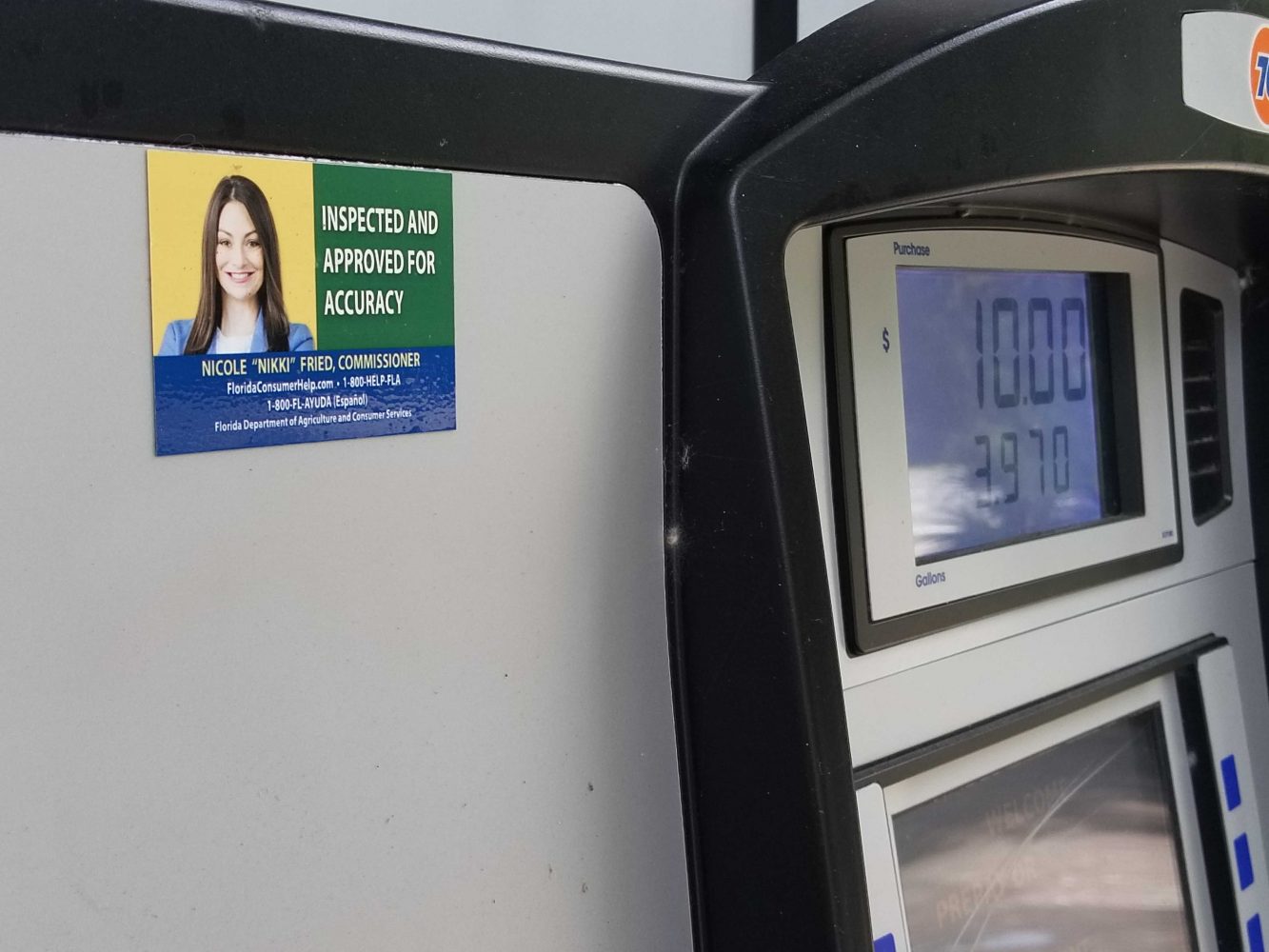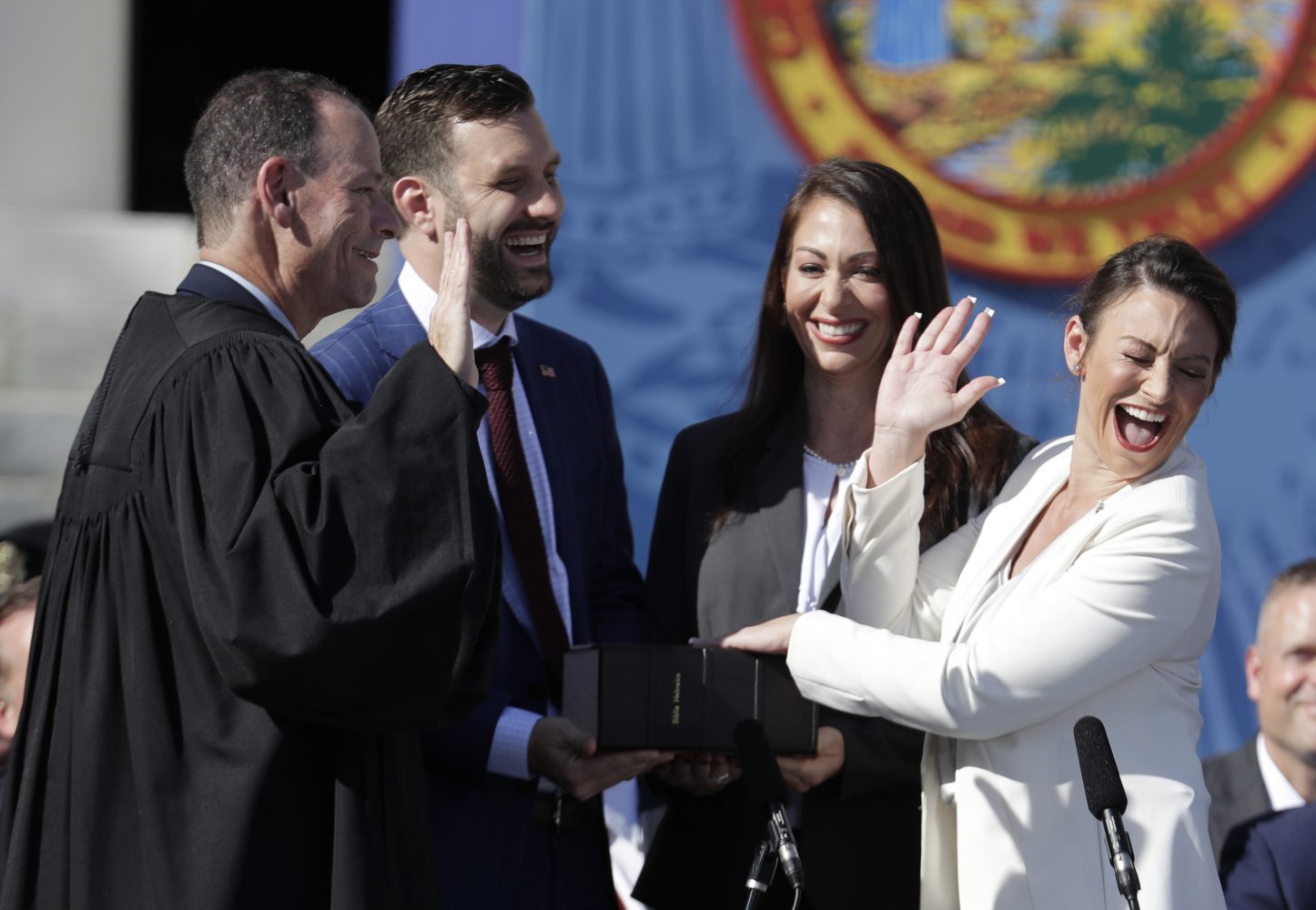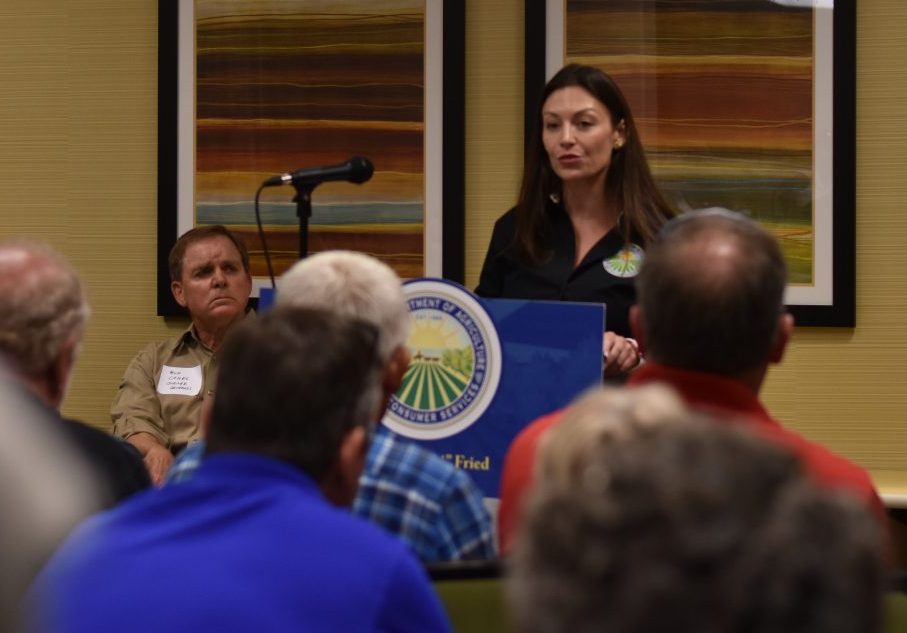
The first woman to head up Florida agriculture shakes up Tallahassee’s ‘Old Boy Network.’
TALLAHASSEE, Fla. — She didn’t sport cowboy hats and her speech lacked twang and drawl. She’d never wrangled cows or spent mornings inspecting dew-kissed orange blossoms. She was the wrong gender and perhaps, in this time, in this Republican-dominated state, she espoused the wrong ideology. She defied the mold of agriculture commissioner that had been cast in Florida. But Nikki Fried managed to score a razor-thin win at the polls.
With that victory came a few firsts. Most notably, she’s the only woman ever elected to head up agriculture in Florida. She’s also the only Democrat sitting on the Cabinet of Gov. Ron DeSantis.
She roared into action a little more than a year ago, determined to redefine the office to which she was elected. She made it clear she was going to be no one’s bubba. But politics works in mysterious ways and months into her term, Fried found herself bogged down by her detractors.
The mere sight of her smile triggered a war between Republicans and Democrats in Tallahassee. Thousands of gas inspection stickers plastered on Florida’s pumps bore a smiling face of Fried, the first commissioner to add such a picture. She called it an effort to increase accountability in the campaign against credit card fraud by gas pump skimming.
 A Florida Department of Agriculture inspection sticker on a Gainesville gas station pump displays Commissioner Nikki Fried’s face. (Matthew Serna/WUFT News)
A Florida Department of Agriculture inspection sticker on a Gainesville gas station pump displays Commissioner Nikki Fried’s face. (Matthew Serna/WUFT News)But that did not sit well with Republicans, especially lawmakers in the House. After a year of grumbling, they threatened to withhold almost $20 million in agriculture funding unless Fried’s face vanished from the stickers. They saw it as a gimmick, “an attempt to gain free political exposure for a re-election bid or a run for higher office,” according to Joe Gruters, the RPOF chairman.
Fried will no longer be smiling at commuters filling their tanks. She lost the face-off with her GOP critics.
Over the past year, Fried has repeatedly clashed with her fellow GOP Cabinet members over an array of issues, from clemency to the hiring of state agency executives.
In classic underdog fashion, Fried has rebounded with the resilience she has owned since her first day. What she has lacked in agricultural expertise or political strategy, she makes up for with spunk and determination.
Last month, she stood on the white marble floors of the Florida Capitol and accused the governor of a “partisan power grab” after he threw his political weight behind a Republican bill to snag the Office of Energy away from her.
She denounced Republican moves against her as “petty” and “pathetic,” and as typical in Tallahassee, fought fire with a press conference and a fervent tweet.
She traveled to Oakland Park recently to tout her efforts to promote energy efficiency and announce a grant to the Broward County municipality to retrofit LED lighting at a local athletics park. The lights would help the city, Fried said, and save $819,787 over the next 25 years.
For local projects like these that save taxpayers’ money, Fried said, the Office of Energy should remain under the umbrella of Agriculture and Consumer Services where it has been for the last decade.
Fried set Florida abuzz in 2018. No one expected her to beat Matt Caldwell, an established Republican politician who had served in the Florida House for eight years. Fried eked a victory with 6,753 more votes to claim the department that oversees Florida’s powerful agriculture industry including citrus and sugar.
She made history and took immense pride in the glass ceiling she shattered, one invisible to many Floridians in the paradigm of southern agriculture politics.
Outside her office, her face adjoined a long line of former commissioners — the white men who had come before her. Incidentally, though not apologetically, her portrait was framed an inch too big. And she insisted on hanging it herself.
Fried had never intended to enter politics. She earned a law degree from the University of Florida and worked as a public defender and a marijuana lobbyist before she made her agriculture run. Even Caldwell, her opponent, conceded Fried broke what he has coined the “Putnam model,” referring to former Commissioner Adam Putnam, a previous rancher and legislator revered in Tallahassee as the ideal candidate.
But breaking glass ceilings is not new to Fried. At UF, she was elected student body president, the first female candidate elected in over two decades. She recalled an outgoing speech in which she prescribed a day that gender wouldn’t be the basis of qualification conversations.
“I see that kind of here, too,” Fried said after she won the agriculture post. “Now that we’ve broken so many barriers …we’ve broken those stereotypes [and] now everybody understands this position is so much greater.”
Jon Mills, a former speaker of the state House and dean of the UF law school during Fried’s student days, said he is proud but not surprised to see Fried end up as agriculture boss.
“Nikki,” he said, “was one of the predictable stars.”
Fried is loud, restless and staunchly opinionated. She makes no bones about her lack of farming experience either.

Last year, she was sworn into office with her hand upon the first American-published Hebrew Bible, borrowed from her alma mater. She owns her Jewish heritage and South Florida roots without apology. She laughs at the idea of ever owning an F-150. Her cowgirl boots look more like kitten heels. She is ‘meshugana,’ which translates to ‘a little crazy’ in Yiddish, says Sen. Kevin Rader, D-Palm Beach County, who credits himself with giving Fried her first push toward the Cabinet position.
Fried arrived in Tallahassee with big ambition and bigger dreams of a day the talks around her term might evolve beyond her qualifiers: Urban. Liberal. Woman.
She delivered her campaign’s promises of ‘weapons, water and weed,’ a mnemonic that pointed to reforming concealed weapons permitting, combating water pollution and spearheading a state hemp program. A 2018 federal farm bill legalized hemp production and Fried wanted Florida to capitalize. She even hired the state’s first cannabis director, Holly Bell, to champion Floridians’ access to hemp and medical marijuana.
Fried counted Florida’s passage of the smokable medical marijuana bill last year as a win for her department. She’s working on legalizing recreational marijuana, though the chances of that passing in Florida any time soon are slim.
Despite partisan rancor, Fried has been able to accomplish a few things in her first year in office.
She heeded agriculture’s paramount importance, as Florida’s second largest industry with a $132 billion yearly economic impact. In part, that meant advocating for Florida county fairs across the state and the department’s “Fresh From Florida” program. Dating back to 1990, the program aims to promote local, Florida-grown fruit and produce.
In the aftermath of Hurricane Michael, Fried urged Congress to pass the $380 million in federal disaster relief for devastated timber producers in the Florida Panhandle. She also sought to update the state’s agricultural best management practices.
“She came into office — admittedly on her part — with little background in agriculture or forestry but has jumped in with both feet to learn as much as she can in the short period of time as she has been elected,” says Alan Shelby, executive vice president of the Florida Forestry Association.
As past commissioners, she has also cast a light on food insecurity in Florida and said it’s a shame that a state known for its vast food production has residents of its own who are hungry and malnourished. She introduced the Hunger-Free School Campus initiative, which promotes innovative ways for schools to increase students’ access to food, like implementing an after-school meal program or a share table at lunch.
Beyond the lunchrooms, gun regulation on school campuses has become a hot topic across the state. Florida’s Constitution mandates that oversight of concealed weapons permitting is under the jurisdiction of the agriculture department. But it was clear from the start that Fried and long-time gun lobbyist Marion Hammer wouldn’t be allies. Despite the increased efficiency for gun licensing boasted by Fried’s department, tiffs with the former NRA president persisted. In December, a feud festered in Tallahassee after Fried filed a legal brief barraging a proposed state law that would prohibit local government officials from passing gun safety ordinances.
Fried also stepped up as Florida’s chief diplomat last year when trade matters were front and center. Last May, Fried wrote a letter to the White House out of concern that Trump’s growing U.S.-China trade war would hurt Florida timber. She also listened to the grievances of Florida berry growers who feared the United States-Mexico-Canada Agreement might prove to be a death knell for domestic berries in the Southeast and pleaded on their behalf.

“A farmer can’t relate to the consumer like she can,” said Larry Carter, a blueberry producer. “I was pretty impressed…I don’t think she’s got to know ag. I think she’s got to be politically connected to get to the right people with her voice to make ag work.”
At the first Cabinet meeting in January of 2019, Gov. DeSantis pardoned the Groveland Four, a notoriously prejudiced Florida case from the 1940s, at the persistent, public request of Fried. Into her second year, Fried has continued to hold the Cabinet publicly accountable for its less-than-impressive clemency rate, with only four citizens’ rights restored in 2019 compared to thousands in years past.
In a February 2019 cabinet meeting, Fried passed a formal resolution recognizing Black History Month in Florida for the first time in 12 years. In March, she appointed Nik Harris as the department’s first advocate for LGBTQ consumers. Joe Saunders, the senior political director of Equality Florida, said Fried has been a terrific ally in a state that has not always embraced the community.
In other cases, Fried leveraged her rising political clout, as the highest-ranking Democrat, to influence state opinion. In one memorable instance, Fried bashed anti-woman attitudes she felt were perpetuated by the President and the GOP via Twitter. Now, ahead of the closely watched presidential primary, Fried’s endorsement is sure to carry weight.
Fried was a sponge her first year, absorbing all that was around her.
Along the way, she would like to believe she has also earned the trust of Florida’s farmers and consumers alike. Whether she succeeds in setting the agenda for a state dominated by political rivals, she remains resolute in her promises. In the end, Fried fulfilled her loftiest promise: she broke tradition.
Her beliefs are not shaken or persuaded by optics, no small feat in the eyes of Mills, the former UF law school dean who is a veteran of the political games in Tallahassee.
Fried is proving Mills right.
“Of course as the only statewide Democrat in this very old boy network, they are rattled by a strong Democratic female who has a voice and opinion,” Fried said. “They are certainly not getting in my way, all they are doing is firing me up to fight harder for the issues that matter.”
As predicted by many, her most onerous challenge was fending off pressure to dilute her agenda. But she resisted in her first year and promises to do so again.
She’s proud she resurrected the tagline of “consumer services” for her department as well as tightened background checks on concealed weapons permitting and introduced a statewide hemp industry.
As she looks to her next 365 days, her narrative has shifted; she has come into her own within the hallowed halls of the Florida Capitol.
Next up on the agenda: Fried hopes to provide relief from chronic hunger for “850,000” Florida children.
 Special Report from WUFT News
Special Report from WUFT News